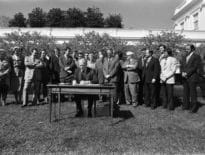Beacon Hill has a clear transit to-do list for the coming legislative session, centered around setting the MBTA up for long-term success.
First, testimony at last week’s State House hearing investigating the MBTA’s safety overseers at the Department of Public Utilities showed and as state Sen. Mike Barrett identified, we need a dedicated body within state government to handle transit safety supervision.
The DPU’s 2010-2015 chair, Ann Berwick, told lawmakers that the agency’s structure made it tough to give transit oversight proper attention.
“I handled it inadequately because my focus and the predominance of my staff, numbers of staff, was focused on electric and gas utilities, rate-setting, related energy issues, and now, after my departure, by legislative mandate, focused on climate,” she said.
Current DPU leaders showed they haven’t failed in their oversight mission through lack of caring about the riding public. But Berwick’s humble analysis offers an important clue as to why the department failed so spectacularly to keep the T from coming off the rails in recent years.
Elizabeth Cellucci, the DPU’s transportation safety lead, outlined how her team has been challenged to hire enough staff to keep up with the damage done by the Baker administration’s austerity attitude to the T’s staffing and maintenance issues. But given how long the MBTA’s safety issues have festered – described in excruciating detail in both the 2019 LaHood report and this year’s Federal Transit Administration investigation – it’s clear that DPU leadership would have addressed its hiring problems sooner if they had enough bandwidth to do so.
Second, in addition to crafting an independent, professional transit safety commission, legislators also need to find a stable and dedicated stream of funding for MBTA operations.
Regular reports and public comments by the Massachusetts Taxpayers Foundation and the MBTA Advisory Board show that Beacon Hill is letting the T get perilously close to driving over a fiscal cliff. The current funding arrangement – a mix of dedicated statewide sales tax revenue, fares and additional state budget allocations – relies on wealthy suburban commuter rail riders to subsidize everyone else’s journeys by paying very expensive fares. It’s out of step with today’s work-from-home realities and the dire need to draw more Bay Staters out of their cars and onto public transit immediately.
The T needs more operations funding to fill the 1,000 to 2,000 positions FTA investigators determined the agency needs to be fully functional and safe, and it needs money to shrink commuter rail fares enough to be a reasonable alternative for most drivers within Route 128. The so-called Millionares Tax, if it passes, can only be used to fund transit construction projects, not the service that will use those public works projects, and its money must also help cut down the enormous backlog of road and bridge repairs – it’s not the most useful answer for today’s transit needs.
The MBTA and the state’s regional transit agencies also need a stable base of funds to help imagine new services to meet the needs of a changing economy. Areas like Burlington, Newton, Woburn and Waltham are seeing massive, mixed-use developments envisioned or built without realistic public transit being built in tandem to support them. We made that mistake in the 20th century, and it helped create the current climate and traffic crises. Let’s not repeat the error.
Letters to the editor of 350 words or less may be submitted via email at editorial@thewarrengroup.com with the subject line “Letter to the Editor,” or mailed to the offices of The Warren Group. Submission is not a guarantee of publication.





